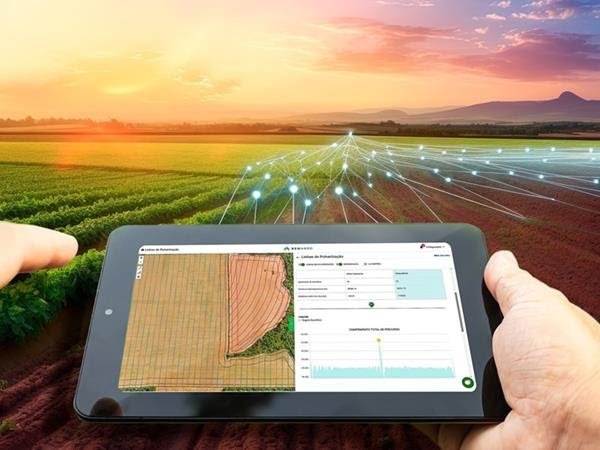Saturday, 21 February 2026

By Harshvardhan Bhagchandka, President, IPL Biologicals Ltd.
Indian agriculture forms the basis of the Indian economy, enabling the employment of more than 50 percent of the population. Even with this significant source of employment, this important sector is facing multiple systemic problems. A major problem is its water issue. Over 80 percent of the country’s water resources are allocated to agriculture, and yet the careless farming practices and irrigation methods employed only serve to worsen the water crisis. In many areas, the combination of overexploited groundwater resources and modern farming techniques has caused a further aggravation of the already critical water situation.
Moreover, Indian agriculture is significantly behind the world in crop yield, which is mainly attributed to poor cultivation practices and lack of pest control. A single pest or pathogen can result in an annual crop yield decrease of 20-40 per cent. The agriculture sector is also at increasing risk of climate change, suffering from the consequences of drought, high tides, floods, and irregular rainfall, which makes farming and harvesting more difficult. To alleviate and tackle these issues, AI seeks to completely redefine the agricultural landscape of India.
AI’s Impact in Transforming the Indian Agricultural Industry
There are endless ways in which AI has the ability to tackle the challenges. One of the best ways that it can work is through increased data collection and analysis. From sowing the seeds and irrigation to harvesting, precision agriculture utilises AI to optimise all aspects of farming. AI-powered farming incorporates real-time data regarding soil conditions, weather predictions, and crop yields by utilising analytics, sensors, and remote sensing. Farmers simply process the information at hand, and AI helps them make efficient, agriculture-enhancing decisions.
AI in agricultural technology comes in many forms, one of which is precision irrigation. Farmers can amplify productivity and scale water resources with advanced AI irrigation systems. This optimises the predicted irrigation needs, and control of the watering system is automatic based on current climatic conditions. This is very helpful for Indian farmers in regions with limited water, as it gives crops the exact amount of water, they need to grow well without wasting any.
AI is also playing a vital role in reshaping pest and disease management. Traditionally, Indian approaches to pest management are rather labour-intensive and largely rely on chemical pesticides, which typically have negative consequences on the environment. More environmentally friendly solutions can come from newly developed technologies such as predictive modelling, artificial intelligence, and machine learning. While artificial intelligence can identify pests and diseases early on so farmers may respond before it is too late and on the other hand, machine learning can forecast the probability of pest outbreaks. This reduces pesticide spraying, eliminates undesired pesticide remnants, and saves money as well.
AI & Biologicals
In recent years, the entire agriculture industry has shifted more towards using biopesticides, biofertilizers, and biostimulants, along with other bioproducts. These biological products are non-toxic to humans and the environment and are obtained from organic matter, thus aiding in strengthening agroecosystems. They have significant importance in the management of soil nutrient cycles, integrated pest management (IPM), and sustainable crop production.
Modern artificial intelligence (AI) techniques in India are improving farming practices in the region. Farmers can now use AI to analyse the optimal timing of applying biopesticides and biofertilizers.
Furthermore, AI makes certain that biofertilizers are provided at the right time which increases soil productivity. This specificity in agricultural processes helps prevent soil salinisation and eutrophication overuse issues, aids sustainable agriculture, and enhances the diversity of the soil microbiome. With the help of AI, it is possible to estimate the soil characteristics as well as how the nutrients will be released, which enables the application of biofertilizers in a more efficient manner. AI can also facilitate the development of new biostimulants.
The Path Forward
As artificial intelligence continues to grow, it is becoming more connected to Indian agriculture. Programs like DigiAgriDiv will provide farmers nationwide with AI tools that increase productivity, improve transparency, and simplify operations. Additionally, the new generation of Indian farmers is becoming more skilled in tech, and that is a piece of good news, as it will help create a bright future for agriculture in the country.
Yet, some of the challenges still cast a long shadow, and the biggest issues are hefty upfront costs and a lack of educational backgrounds among farmers. For AI to truly take root and thrive, it’s essential to close the digital gap, make advanced technologies more affordable, and ensure that educational resources reach farmers, especially those in rural areas.
All in all, it can be said that we are witnessing a new dawn in Indian agriculture, where sustainability and high-tech efficiency are almost like two peas in a pod. By blending biological methods with artificial intelligence, farmers all over India can enhance their harvests while being kind to Mother Earth. AI brings a treasure trove of solutions to the urgent challenges facing the industry, including pinpoint irrigation, prompt pest management, and reliable weather predictions. With AI stepping into the field, the agricultural landscape in India is on the brink of a remarkable metamorphosis that caters to both today’s demands and tomorrow’s aspirations.